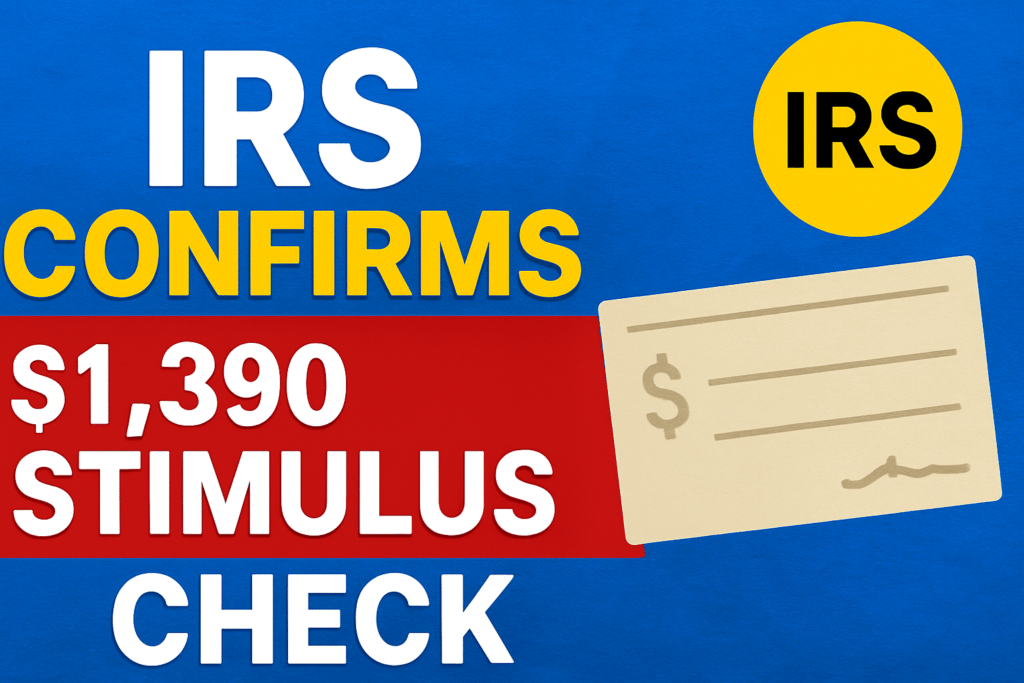
IRS Denies $1,390 Stimulus Checks for Summer 2025 — What Americans Need to Know
n recent weeks, headlines and social media posts have sparked a wave of excitement claiming that the IRS is preparing to send out $1,390 stimulus checks to millions of Americans this late summer. Many people rushed to find out if they were eligible for these supposed payments, hoping for much-needed relief in today’s tough economy.
But here’s the truth: the IRS has confirmed that no such stimulus checks are being issued in summer 2025. While the topic is trending online and fueling discussions, it’s important to separate fact from fiction. Let’s break down where the rumor came from, what the IRS has actually said, and what Americans should really know about financial relief in 2025.
1. How the $1,390 Stimulus Check Rumor Started
The story of the so-called $1,390 IRS checks didn’t come out of thin air. Several misleading articles and viral posts circulated online, making it seem as though the government had approved another round of direct payments. Some headlines even used wording like “IRS confirms” or “late summer payout,” creating confusion for readers.
This misinformation spread quickly on platforms like Facebook, TikTok, and YouTube, where financial rumors often gain traction. Many Americans, still feeling the aftereffects of inflation and rising costs, were naturally eager to believe help was on the way.
However, these claims were not based on any official announcement. In fact, the IRS has directly clarified that no new economic impact payments are being issued at this time.
2. Why People Believed the Rumor
There are two main reasons why the rumor gained so much attention:
a) The Recovery Rebate Credit (RRC)
Earlier in 2025, the IRS distributed billions of dollars through the Recovery Rebate Credit, which allowed people who missed earlier COVID-era stimulus checks to claim payments of up to $1,400 per person. Those payments were real—but the program closed on April 15, 2025.
Because that program was so recent, many people assumed the new $1,390 figure was connected, even though the IRS has made it clear that the rebate is no longer available.
b) Political Proposals Misunderstood
Around the same time, lawmakers floated ideas for future relief measures, such as the American Worker Rebate Act, which proposed direct tax rebates funded by tariffs. While that bill made headlines, it has not been passed into law. Some websites used this to suggest new checks were guaranteed, which is simply not true.
3. What the IRS Has Officially Said
The IRS has been very clear:
- No new stimulus checks have been approved.
- No $1,390 payments will be distributed this summer.
- The Recovery Rebate Credit deadline has already passed, and no extensions are available.
- Any future stimulus payments would require Congressional approval before the IRS could take action.
This means that unless new legislation is passed in Washington, Americans should not expect surprise deposits from the IRS.
4. The Legal Process Behind Stimulus Payments
It’s helpful to understand how stimulus checks actually work. Contrary to viral rumors, the IRS doesn’t decide on its own to send out money. Here’s the process:
- Congress passes a law authorizing relief payments.
- The President signs the bill into law.
- The Treasury Department and IRS distribute the funds.
During the pandemic, this process happened several times, which is why millions received direct deposits quickly. But without new legislation, the IRS cannot issue fresh payments.
5. Common Myths and Misconceptions
Since the rumor started, several myths have circulated. Let’s clear them up:
- Myth 1: “Everyone will get $1,390 this summer.”
Fact: False. No payments are approved. - Myth 2: “The IRS already confirmed the checks.”
Fact: False. The IRS has denied the rumor directly. - Myth 3: “This is connected to the $1,400 stimulus.”
Fact: The Recovery Rebate Credit is over. This rumor is unrelated. - Myth 4: “Social Security and SNAP recipients will automatically qualify.”
Fact: No payments are planned, so no eligibility rules exist.
6. Why These Rumors Are Risky
Beyond disappointment, these rumors can actually cause harm:
- Scams: Fraudsters often take advantage of trending topics. Fake emails, texts, or calls may claim you need to “verify your information” to receive a check. Remember: the IRS does not contact taxpayers this way.
- False Hope: Many families plan their budgets based on news of relief. Relying on inaccurate information can lead to financial setbacks.
- Misinformation: Viral content spreads quickly, making it harder for people to know what’s real.
This is why the IRS urges Americans to rely only on official updates.
7. What Relief Programs Are Actually Available in 2025
Even though no new federal stimulus checks are being issued, there are still ways some Americans can find financial support:
- Tax Credits: Families may qualify for the Child Tax Credit or Earned Income Tax Credit.
- State Programs: Some states continue to offer targeted relief, rebates, or tax refunds.
- Social Programs: Benefits like SNAP, Medicaid, and housing assistance remain available for eligible households.
Checking directly with state government websites and IRS.gov ensures you get accurate information.
8. Frequently Asked Questions (FAQs)
Q: Will I get $1,390 this summer from the IRS?
A: No. The IRS has confirmed there are no payments scheduled.
Q: What about the $1,400 stimulus I heard about?
A: That was part of the Recovery Rebate Credit, which ended in April 2025.
Q: Could new checks be approved later this year?
A: Only if Congress passes a new law. As of now, no such bill has passed.
Q: How can I avoid scams?
A: Ignore calls, emails, or texts claiming to be from the IRS. Always check IRS.gov for official updates.
9. How to Stay Updated
The best way to stay informed is to:
- Visit IRS.gov for official announcements.
- Follow credible news outlets.
- Be skeptical of viral posts that don’t cite reliable sources.
This ensures you get facts—not rumors.
Conclusion
The excitement around a new $1,390 stimulus check may have sparked hope, but the reality is simple: no such payments are coming in summer 2025. The IRS has denied the claims, and without new action from Congress, no stimulus checks can be issued.
While the misinformation wave may continue online, Americans are best served by staying alert, avoiding scams, and relying on official updates. Financial relief programs still exist, but they are not the same as a brand-new stimulus payout.
For now, the takeaway is clear: be cautious, stay informed, and don’t let viral rumors shape your financial decisions.


Leave a Reply